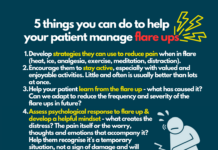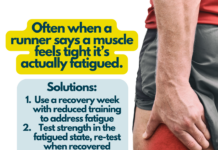Our articles are not designed to replace medical advice. If you have an injury we recommend seeing a qualified health professional. To book an appointment with Tom Goom (AKA ‘The Running Physio’) visit our clinic page. We offer both in-person assessments and online consultations.
I have to admit I’m a little embarrassed writing this. Here I am, a Physio with his own website on managing and preventing running injuries about to defer on a marathon because I’m injured. The truth is though that sometimes it really is the best choice to make. So how do you decide whether to push on or pull out?
When we train for a race it’s a big investment of time and energy. We sacrifice things to fit in the mileage. Gone are Sunday morning lie-ins, boozy nights out and half of my toenails. It’s a juggling act squeezing in runs home from work, justifying a pub walk as ‘cross training’ and balancing family and relationship commitments. It is hard. Any runner who’s partner doesn’t run will have heard their loved one ask, “you’re running again?!” and had to justify their fourth/fifth/sixth run of the week.
So deciding that after all this training and sacrifice that you won’t run the race you’ve worked hard for is painful. What makes it worse, certainly for me, is knowing what you’re about to miss out on. I loved Brighton Marathon last year. I still buzz thinking about it. I’m gutted to know I won’t run it this year. I pass the road signs each day saying “road closure for Brighton Marathon April 14th” and my heart sinks.
It’s a surprisingly emotive topic missing a race and that can persuade us to make bad decisions and just “run through it”. This is also sometimes the advice you’ll get, especially from hard-as-nails blokes who champion the phrase Man the F**k Up! Don’t be persuaded by this macho rhetoric, you have to make your own choice…
Coming to a decision
When deciding if to defer there are a few factors to consider;
- What’s actually wrong with you? – some conditions will flare up briefly and settle quickly, you’ll need some guidance from your Physio on this. Every individual situation is different. Many conditions though may experience a long term deterioration if you ignore your pain and race. Tendinopathy, for example, may progress from a reactive tendon (which usually recovers well with rest and a little rehab) to a tendon with structural changes or degeneration (which often requires lengthy rehab). For some things racing is an absolute no go, if there is any suspicion of stress fracture for example then don’t race and get properly checked out.
- Advice from health professionals – a key point here is to see a Physio or health professional experienced in sport. In-experienced or non-sporty physios are more likely to air on the side of caution and just say, “don’t run” even when not necessary. I’ve met people who have been out of running for a year after a simple calf strain because their GP insisted they shouldn’t run. Personally, I don’t think as health professionals we should be telling people not to run. Our job is to tell people the risks, the pros and cons and let the athlete make an informed decision. So, if you haven’t already, seen an experienced health professional and ask their opinion. In many situations, they’ll find a way to help you run if you can be fixed…
- Can you fix it? Now ‘fix it’ is probably the wrong phrase – we aren’t like cars, just stick a new fan belt in and away you go! That said, sometimes with the right input things can improve significantly. I’ve seen quite a few runners hobble in a couple of weeks before a race and yet make it to the finish line unscathed on the big day. Often the right advice during the taper period can really help and sometimes taping techniques can be effective in offloading healing tissue for a while. In many cases, it comes down to resting from running completely for a short while and making your priority being injury-free not squeezing in more miles or ‘testing’ an injury (more on this in while…)
- How much time is left? Time is a great healer and I’m often surprised how well the body will heal itself if you let it. For some races, you need to defer well in advance but for some, like Brighton Marathon, you can wait until the last few days before the race. Give yourself as much time as possible before making the decision. Healing times for injuries vary considerably. A sore overworked muscle might settle in a few days or a couple of weeks. With an actual tissue tear though it is much longer and will vary depending on severity. Very roughly speaking muscle injuries heal in 6-8 weeks, tendons and ligaments take longer at around 12 weeks. It may take longer to reach a level where you can run a race, especially long-distance events.
- Are you really going to make it round? I say to myself that I could run this marathon, it’d hurt but I’d get round. In reality, though I can’t run across a road at the moment without pain! I haven’t run more than 4 miles in 5 weeks 26.2 is out of the question! You have to ask yourself whether you really could do it, and more than that, could you enjoy it? Is it really worth a lot of pain just to ‘get round’? Part of this question is also are you fit enough? Your injury might hold up but will all the missed mileage take its toll?
- What are your goals? If your main aim is to beat a PB then you probably won’t achieve that running injured. If however you just want to experience the race and the atmosphere and you think you could find a way of comfortably plodding round then it should be possible.
- Likely impact of running the race – think short term and long term. In to short term you’ll be sore, how will that affect you? Would you have to miss work? Can you see someone to help you? Is it likely to settle quickly – how has it been after running recently? In many ways, long term impact is more important. In my case running less than 4 miles aggravated my pain for 5 days (in fact it still hasn’t settled). Running the whole marathon might aggravate it for weeks or even months taking it from a fairly simple reactive tendinopathy to something more long term. Most injuries are treatable and will recover but do you want to face missing running for some time and a lengthy period of rehab. If there are likely long term implications then deferring is the most sensible option.
- Your running plans and race schedule – for some a race might just be one of many races in their calendar. Missing it might well mean being fit for other events. For other runners, especially those tackling marathons or raising for charity, the race might be the Big One – a once in a lifetime challenge. If this is the case and you have no plans to run soon after the event then you have a little more freedom to take risks. That said, this should always be just part of your decision!
Once you’ve made a decision be prepared to review it. Things do change but be careful not to jump to any rapid conclusions! Just because you feel a bit better for a day or two doesn’t mean you’re suddenly fit to compete!
When the dust has settled and the decision is made it’s important to reflect on how you got injured to learn from it and stop it from happening again.
Honest reflections on my injury
My injury is my fault. I haven’t been unlucky or cursed I’ve just been a bit careless. I’m not beating myself up about it though as it’s an easy and common mistake to make. I was trying to beat my PB of 3:12 for the marathon and this meant pushing hard. In doing this we tread the thin line between peak performance and injury. Sadly I crossed that line.
This is why…
Taking on too much – FMG and I bought our first home in December and we’re getting married in September. This is all fantastic however it has meant that while training for a marathon I’ve been renovating our home, planning a wedding, working 2 jobs and building the website! This makes planning 4 runs a week very difficult. I’ve had to run home from work carrying my stuff in a heavy back which is part of what aggravated my hamstring. It’s also been pretty stressful and I’ve realised that, in future, I need to strike a better balance.
Inadequate preparation – moving home meant virtually no running in November and December. I dropped to 10 miles per week which meant a massive step up to 34 miles in my first training week.
Neglected strength and conditioning – In all my training I did just 2 strength and conditioning sessions! Partly this was due to lack of time but I should have prioritised and cut out a run or two instead.
Overconfidence – most of 2012 I spent running up hilly trails. I felt like I’d toughened up my legs and marathon training on the flat would be fine. My first training run, scheduled as a slow, flat 7 miler, I ran off-road on huge hills. Oh, and I did 10 miles rather than 7. By the end of my first week, my hip hurt! I ran every run slightly faster than my schedule suggested, just because I could.
Changed too much, too quickly – as a natural progression from overconfidence I did far too much without really thinking. In a rest week of reduced mileage, I decided I’d hit the hills again for the first time in 2 months. I did all 4 training days on hills and even did a speed interval of 1.5 miles all uphill. 3 days later I ran home with a heavy pack (faster than I should). The next day, carrying a niggle, I ran a 10-mile tempo (again faster than recommended) and then couldn’t walk after.
Didn’t modify my training enough – you’d think carrying a niggle I’d have slowed down a bit!? No, still did the vast majority of my runs at less than 8 minutes per mile.
Didn’t rest enough – I ploughed on through niggles as in the past they’ve always just gone away. I should have just had a few days rest.
Focused on squeezing in runs lost sight of the bigger picture – because I was a bit of ‘schedule slave’ I became a bit obsessed with not missing a training run. Because of this, I’ve missed about 25…Oh and the marathon.

You’d think having written this advice out many times before on RunningPhysio I’d have learned! It goes to show really, knowing what to do and actually doing it are two very different things! It’s all very good knowing the theory but you have to put it into practice!
There are positive things to take from an injury – I’ve learned important lessons to stop it from happening again. Next time I’m training for something I’ll be more sensible, progress slowly, rest more, strengthen up and absolutely smash the race!
Final thoughts: choosing to defer is a tough choice. Sometimes though it’s better to think long term, rehab properly and come back stronger. There will always be other races!
If you’re injured and are considering deferring a race see your Physio or health professional for expert advice. As ever on RunningPhysio if in doubt get checked out!










Excellent advice….helps to alleviate some of my frustration with my training being side-lined by injury.
After reading this I am getting a better perspective of why I really need to put as much effort into my strengthening exercises, as I did in my training – this is valuable because strengthening work feels like light-weight fluffy stuff …….NOT being able to ‘do’ still sux 🙂
Having deferred two marathons now, Amsterdam last October (different injury) and Paris next Sunday, I can relate to this completely. It may even turn into a third deferral as I also have Edinburgh coming up at the end of May but don’t know if I’ll be fit in time. The frustration for me this time is that although I did pick up the injury whilst running, I could just as easily have done it walking along the road. I’m pretty devastated that I keep having these setbacks as I’m trying to achieve a time goal before I get too old and knackered. As with you, positives do seem to be appearing out of the gloom though, with the knowledge that there’s still time and plenty of chances, but also that there may be other, different, goals I can chase.
I hope your injury heals quickly and you can get back to training properly. Good luck with the wedding plans too.
Lise
My decision to pull out of a race has effectively been made for me as I am just unable to run. And as much as I can’t really explain why I got my latest (oh yes, there’s a series of them) injury, I have tried to start training again too soon (despite following the excellent advice on this website on returning to running after injury). I am now limping again and should be wearing your T-shirt!
I have spent so much time lately reading about running injuries, time when I would have been out running I suppose. This is one of the best websites I have found, and it is comforting to know from this article, and various forums, that the feelings of absolute frustration, disappointment, anger and upset I have been feeling over the last few months are not unique.
Thank you.
Tom, this is such a moving post and so much sense too. I’m so sorry you’re injured but it is so important to see someone walk the talk on all this and not battle on like it’s the ‘runner’s way’ to run through pain and injury. I don’t know if I’m out of my much hoped for marathon. I missed Barcelona last year due to a calf tear and have had to drop out of Edinburgh and others due to family weddings and things. But having made it to taper this time, I know I want to feel good and strong when I take those first marathon strides and I want to make sure that I can run for a long long time, not just one 12 and a bit miler. Thank you for your help and support. Recover quick and strong. NBSue 🙂
Excellent blog Tom & very wise advice. I sometimes get contacted by customers about their slow recovery from plantar fasciitis / shin splints / Achilles tendinosis etc., and when I ask ‘are you running’ the answer is always an embarrassed and sheepish ‘yes’. I spare them a lecture 🙂 because I understand that for true runners, running is not a ‘hobby’ or even a ‘sport’, it is a passion as essential to some as breathing. So, when they can’t run, they are miserable. Your advice to train smart, listen to your body and recognize that recovery is an essential part of any strategy, is spot on.
Wow…I am sorry to hear you missed the marathon this year. I have no doubt you will be ready to go next year. Good Luck from your friend Withsanta.
Thank you all.
I am so frustrated with my injuries. I am a physio too. I am with stupid, but not alone and you all confirmed that! Two Duathalons and 3 road races signed up for. It’s the cost that really gets me, and I hate to wear t shirts I didn’t earn. And I want PIE!
I made it all the way through my first training program last year – uneventfully – only to have my Achilles go kablooey (literally, I had no inkling anything might be wrong until it was) during my taper, two weeks before the Dallas Marathon in December. My first marathon. I was devastated given all of the time and effort put into my training, but I also knew there was no way I’d be able to run it given the fact that I had trouble walking. My physical therapist agreed with me. Fortunately (I guess) for me, the race ended up being cancelled so I didn’t have to deal with the whole DNS thing. By the end of the year, I was back to easy running and actually PRd a half marathon in April. Training for marathon attempt #2 (Honolulu – zero chance of ice cancellation, and injured runner/walker friendly!) starts in a few weeks and I’ll hope for the best this time around.
I know of runners who would rather start the race and end up pulling out mid-race (one in particular, seems to get a great deal of personal satisfaction out of her DNFs, whatever) with an even bigger injury than have anyone in the running community think they are “weak” or “wussy” or unable to otherwise deal with pain. I don’t understand that philosophy, but I’m playing the long game when it comes to running. Quality vs. quantity is my mantra!
Having said all that, it sucks to be injured and have to miss a race…but especially a marathon. You definitely have my sympathy but you’re right – better to defer than have a bad and potentially dangerous marathon.
Im so glad ive read this although I would have kept searching till I found some thing positive.
I tore my calf muscle not whilst running but at work a few days after running a 50 mile ultra so my muscles were probably weakened. This was end of July Ive finally built up to running 13 miles again but had already booked a marathon this weekend then Snowdonia marathon in two weeks. (Id done back to back marathons in prep for the 50). Im tentatively going to do the one this weekend as its a flat one to see how I go if it niggles the plan is to stop as I had to have 3 weeks off work when it tore and cant do that again. But need to see how I am on the flat before Snowdonia and if I cant do York Ill know I cant do Snowdon. I am all taped up ready and just going for the mileage and atmosphere. Fingers crossed Any advice?
Comments are closed.